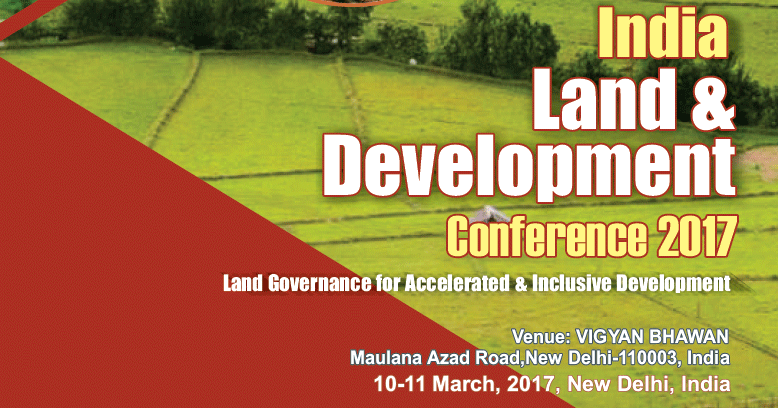Land Governance for Accelerated and Inclusive Development
5-6 April, 2017, New Delhi, India
Introduction
Land is globally seen as a potential tool to create conditions and opportunities for realizing social and economic equality and maintain cultural identity. Good land governance is vital to shared prosperity, accelerate, inclusive and sustainable development. Secured land tenure, especially for women and indigenous communities, now considered as the key to to achieving the global commitments like UN’s SDGs and VGGT of FAO.
Demand for land, as a resource, is increasingly growing to meet the need of India’s economic growth ambitions and ecological sustainability and while it also remains important to ensure equity, poor people’s dignity, cultural identity, women’s empowerment, and equality of opportunity. Land is looked as a key resource and making land available for investment is increasingly being emphasized under ‘Doing Business’ and ‘Make in India’ approach. There are, also evidences of increasing conflicts around land, resulting in stalling and threatening investments.
While land policies recognize many challenges and have undergone changes, the implementation remains suboptimal with institutions continue to follow the business-as-usual approach. Land governance is characterized by multiplicity of implementing organization with overlapping territory and responsibility. The land-laws, having inherited multiple and diverse legacies, remain complex, voluminous, often with conflicting statues and confusing interpretations. They have not been very effective in adapting to newly emerging challenges and changing situations and also in taking benefit of technological developments. At the same time, land being a state subject and being dealt differently by states in response to changing needs have resulted experiences, innovations and good practices, with potential of cross learning and sharing.
There remain also, enormous unrealized potential to improve land governance. Many stakeholders erroneously assume that land policy is a zero-sum game, that is, any gain for one group will cause equal losses to another, which is not true. Clear and authoritative recognition of land rights can increase investment, sustainable land use, and welfare by women, tribal or informal occupants who previously lacked such rights and reduce conflict. New technology provides options to use land governance challenges as an opportunity.
Land engagements in India, have largely remained limited to interventions by the Government Department or handful of donors, NGOs and research institutions. While everybody finds it easy to identify with land and talk about land, land as a discipline in academics or in policy and development discourse has remained largely and comparatively undeveloped and unexplored. Contested landscapes of contemporary Land governance in India justify and necessitate larger and more intensive engagement of multi-stakeholders actors to make it pro-poor, inclusive and sustainable.
Need of interacative interfaces, information sharing, constructive debates, cross-boundary and inter-disciplinary deliberations around land across the rights, uses, technologies, legal-issues are increasingly felt. The evolving and expanding discipline and sector of land, requires assimilation and intense engagements of disciplines across social, cultural, legal, natural and applied sciences. Making land governance inclusive is critical to India’s accelerate developments.
Participant Interviews
Mr. Shyam Khadka (FAO):
Dr. Namita Wahi (Centre for Policy Research):
T. Haque (Land Policy Cell):
Prof. H.M. Desarda (Gokhale Institute of Politics and Economics):
Mr. Sharat Singh:
Ms. Seema Kulkarni (MAKAAM & Soppecom):
Dr. Dimple Tresa Abraham:
Ms. Rohini Chaturvedi (WRI India):
Mr. Pranab Choudhury (NRMC, Centre for Land Governance):
Dr. Prerna Prabhakar (National Council of Applied Economic Research):
Ms. Soma Kishore Parthasarathy (MAKAAM):
Ms. Pranati Das (Landesa):
Wakelet
Session 1 Presentations
Session 2 Presentations
Session 3 Presentations

